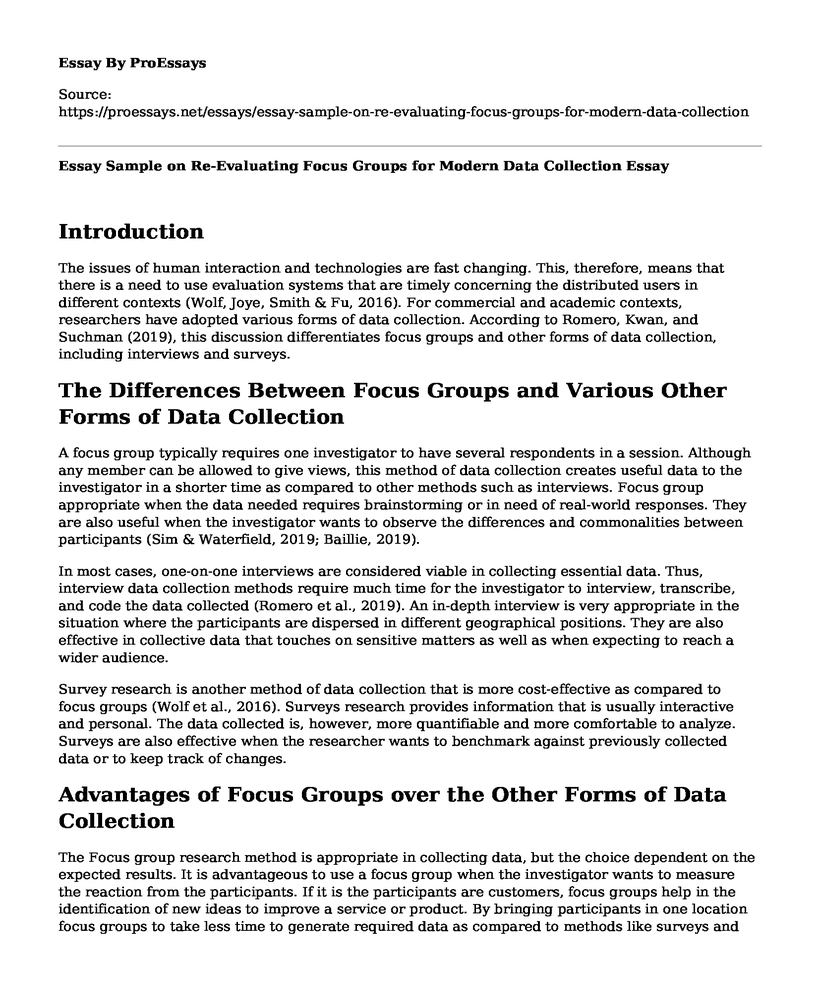Introduction
The issues of human interaction and technologies are fast changing. This, therefore, means that there is a need to use evaluation systems that are timely concerning the distributed users in different contexts (Wolf, Joye, Smith & Fu, 2016). For commercial and academic contexts, researchers have adopted various forms of data collection. According to Romero, Kwan, and Suchman (2019), this discussion differentiates focus groups and other forms of data collection, including interviews and surveys.
The Differences Between Focus Groups and Various Other Forms of Data Collection
A focus group typically requires one investigator to have several respondents in a session. Although any member can be allowed to give views, this method of data collection creates useful data to the investigator in a shorter time as compared to other methods such as interviews. Focus group appropriate when the data needed requires brainstorming or in need of real-world responses. They are also useful when the investigator wants to observe the differences and commonalities between participants (Sim & Waterfield, 2019; Baillie, 2019).
In most cases, one-on-one interviews are considered viable in collecting essential data. Thus, interview data collection methods require much time for the investigator to interview, transcribe, and code the data collected (Romero et al., 2019). An in-depth interview is very appropriate in the situation where the participants are dispersed in different geographical positions. They are also effective in collective data that touches on sensitive matters as well as when expecting to reach a wider audience.
Survey research is another method of data collection that is more cost-effective as compared to focus groups (Wolf et al., 2016). Surveys research provides information that is usually interactive and personal. The data collected is, however, more quantifiable and more comfortable to analyze. Surveys are also effective when the researcher wants to benchmark against previously collected data or to keep track of changes.
Advantages of Focus Groups over the Other Forms of Data Collection
The Focus group research method is appropriate in collecting data, but the choice dependent on the expected results. It is advantageous to use a focus group when the investigator wants to measure the reaction from the participants. If it is the participants are customers, focus groups help in the identification of new ideas to improve a service or product. By bringing participants in one location focus groups to take less time to generate required data as compared to methods like surveys and interviews. A Focus group is also instrumental when the respondent wants to enquire about the respondent's beliefs, experiences, attitudes, insights, or perceptions (Baillie, 2019). This, therefore, means that focus groups are more effective in collecting data is more difficult for other methods. Another advantage pertains to the use of focus groups to collect additional data as an adjunct to other methods collecting quantitative data.
Whether to Look at Homogeneity or Heterogeneity
When deciding to use focus groups, the investigator should develop a group guide, number, and type of participants. Choosing the type of participants requires identifying homogeneity and heterogeneity. Focus groups can be homogenous when the participants show similar demographic characteristics, while in heterogonous focus groups, the participants have varying demographic characteristics. Participants showing homogenous characteristics should be put in one focus group (Sim & Waterfield, 2019). The various chosen focus groups by the investigator should have heterogeneous characteristics.
Conclusion
In conclusion, the focus group data collection method is appropriate in certain circumstances depending on the expected results. It is, therefore, salient that the researcher identifies the advantages and disadvantages of the method so that he can prepare appropriately. Besides, the investigator should understand the nature or type of the respondents for the focus groups. Participants who show homogenous characteristics are usually put in one focus group.
References
Baillie, L. (2019). Exchanging focus groups for individual interviews during qualitative data collection: a discussion. Nurse researcher, 27(2). http://oro.open.ac.uk/56539/
Romero, D., Kwan, A., & Suchman, L. (2019). Methodologic approach to sampling and field-based data collection for a large-scale, in-depth interview study: The Social Position and Family Formation (SPAFF) project. PloS one, 14(1). https://www.ncbi.nlm.nih.gov/pmc/articles/PMC6333380/
Sim, J., & Waterfield, J. (2019). Focus group methodology: some ethical challenges. Quality & Quantity, 53(6), 3003-3022. https://link.springer.com/article/10.1007/s11135-019-00914-5
Wolf, C., Joye, D., Smith, T. W., & Fu, Y. C. (Eds.). (2016). The SAGE handbook of survey methodology. Sage. https://books.google.co.ke/books?hl=en&lr=&id=g8OMDAAAQBAJ&oi=fnd&pg=PP1&dq=Wolf,+C.,+Joye,+D.,+Smith,+T.+W.,+%26+Fu,+Y.+C.+(Eds.).+(2016).+The+SAGE+handbook+of+survey+methodology.+Sage.&ots=DytLluV4oW&sig=Q7niGsNEfKUAYqg5sARUXtLVoOc&redir_esc=y#v=onepage&q&f=false
Cite this page
Essay Sample on Re-Evaluating Focus Groups for Modern Data Collection. (2023, May 09). Retrieved from https://proessays.net/essays/essay-sample-on-re-evaluating-focus-groups-for-modern-data-collection
If you are the original author of this essay and no longer wish to have it published on the ProEssays website, please click below to request its removal:
- Phenomenological Research Design: Limitations and Amelioration
- Essay Sample on Use of Research in Not-For-Profit and Public Sector Organization
- Structural Equation Modeling and AMOS Paper Example
- Data Analysis and Interpretation of Empirical Findings Paper Example
- Evaluation Essay on Apple: Leading Innovation With Unique Products and Digital Content
- Essay Example on Needs Analysis: Identifying Goals and Strategies for Success
- Free Report Sample on Criminal Intelligence Agency: Leveraging Math Models to Improve Decision-Making







